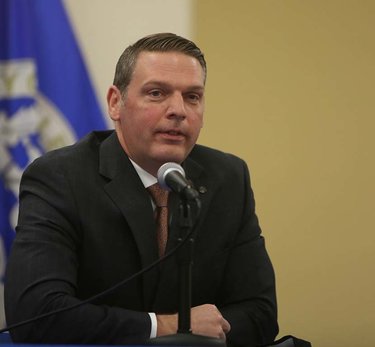Pilot court to offer treatment instead of prison to offenders with mental-health issues
The Enterprise — Michael Koff
“In the early part of the 2000s, when I was practicing in Albany Police Court, when there was a noticeable need for an individual who was struggling with mental illness, the discussion of a diversion track never existed,” said Daniel Lynch, deputy Albany County executive.
ALBANY COUNTY — The county has launched a pilot program to place people with mental-health issues who are arrested for low-level, non-violent crimes into treatment programs instead of prison.
The Albany Alternative Treatment Court will initially serve 15 defendants.
Daniel McCoy, the county’s executive, said a variety of partners had been working on the initiative since he asked the question in his 2016 State of the County Address: “How can you change the outcomes of people’s lives?”
He noted that the United States has the highest rate of incarceration of any nation in the world and said, “It hasn’t worked.”
McCoy, at a press conference on Friday, went on, “Many individuals in the criminal justice system do not do it because they are bad people but rather they have mental illness.” He said, in his 20 years as a city fireman, he realized a lot of calls were the result of mental-health patients not taking their medications.
“All over the United States, studies have shown that well over half of adults, even as high as 56 percent, are living with some type of a mental illness,” McCoy said. With some not even realizing they need help, he said, they may “slip through the cracks.”
Instead of criminalizing people with mental illnesses, McCoy said, the new court will divert them into the treatment they need and make the community safer. With treatment, he said, they will stop reoffending.
The Albany Alternative Treatment Court will be the first mental health court in the 3rd Judicial District, said Edwina Mendelson, deputy chief administrative judge for Justice Initiatives of the State Office of Court Administration, who spoke through a video screen at the press conference.
The state’s first mental health court opened in Brooklyn in March 2002 with just a handful of participants, said Mendelson. Two decades later, the state has 31 mental health courts with four more being planned.
As of January, she said, 12,000 people have participated in those courts with more than 6,000 successfully completing court-ordered programs.
“They leave with the tools they need to take care of themselves, support their families, and meaningfully contribute to our communities,” said Mendelson.
Before the mental health courts came into being, she said, individuals with mental illness were faced with two choices in court: They could plead guilty or go to trial. Either choice frequently resulted in incarceration or harsher non-jail sentences than for others charged with similar crimes, Mendelson said.
Mental health courts provide a “welcome third option” where individuals are “linked to long-term treatment and services as a true alternative to incarceration,” said Mendelson.
She went on to describe two outcomes of the courts: They improve the psychiatric and social stability of participants and they improve public safety.
“You will see participants and families from every walk of life, every ethnicity, every race, and varied faith traditions,” Mendelson said of those who will be using the Albany Alternative Treatment Court.
“Those who are marginalized by mental illness and by poverty and by criminal behavior will look to this wonderful, beautiful new court you have all created and they will be looking to you for help and for recognition of their human dignity,” Mendelson concluded.
“Our jails and our prisons have become what some have called de facto psychiatric hospitals,” said Stephen Giordano, who directs Albany County’s mental health department.
He named the Los Angeles County Jail, the Cook County Jail in Chicago, and Rikers Island in New York City as “the three leading de facto psychiatric hospitals in the country — and that is just simply wrong,” he said.
“People that live with mental-health challenges are more likely to be the victims of crime than the perpetrators of crime ...,” said Giordano. “Treating suffering people is always a win-win for the community.”
Giordano went over a continuum of services that Albany County offers mentally ill residents including a 24-hour mobile crisis team, law-enforcement training in crisis intervention, jail diversion efforts in court, a “robust clinical team” at the county’s jail, and a re-entry task force.
Five years ago, Giordano recalled, McCoy said, “You’re missing a piece.”
Daniel Lynch, deputy county executive, helped shepherd the idea to fruition.
Lynch said, in his 13 years working as a prosecutor in the Albany County District Attorney’s Office, he could see there was “a true need to fill in the gaps.”
“In the early part of the 2000s, when I was practicing in Albany Police Court, when there was a noticeable need for an individual who was struggling with mental illness, the discussion of a diversion track never existed,” said Lynch.
Rather, he said, the focus was on whether the individual was “competent” to be tried.
Individuals will be identified for entering the pilot Albany Alternative Treatment Court program, Lynch said, by social works in Albany City Court who will evaluate “those who are being identified by a participant in the court system.” This could be the person’s lawyer, a police officer, or a judge.
“We’re looking at folks who have demonstrable serious and persistent mental illness and that there is agreement between the prosecutor and the defender and the mental-health experts that that illness has contributed” to their being in court, Giordano said.
“There are folks with mental illness who end up in jail because their criminal acts require them to have consequences,” Giordano said. “We’re interested in diverting those folks who are unnecessarily incarcerated because their illness has contributed to low-level crimes.”
He concluded, “We have a continuum of options for people and this was the missing piece.”



